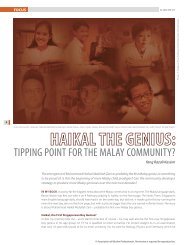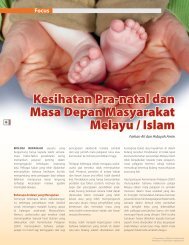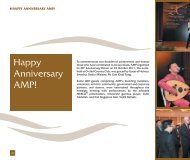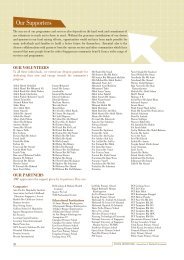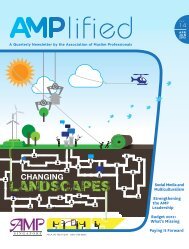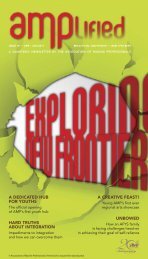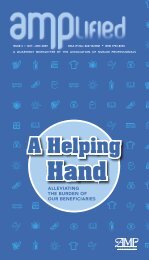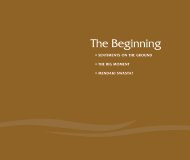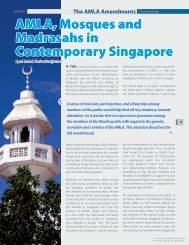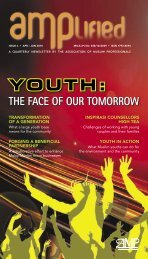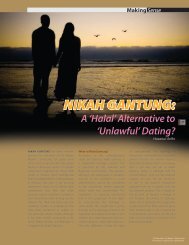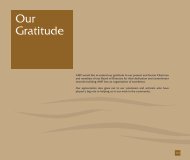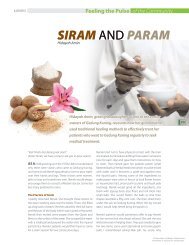Zulm and Chronic Illnesses - Association of Muslim Professionals
Zulm and Chronic Illnesses - Association of Muslim Professionals
Zulm and Chronic Illnesses - Association of Muslim Professionals
Create successful ePaper yourself
Turn your PDF publications into a flip-book with our unique Google optimized e-Paper software.
Feeling the Pulse <strong>of</strong> the Community KARYAWAN<br />
<strong>Zulm</strong> <strong>and</strong><br />
<strong>Chronic</strong><br />
<strong>Illnesses</strong><br />
Dr Radiah Salim<br />
20<br />
The emergence <strong>of</strong> chronic illnesses is largely due to poor<br />
dietary <strong>and</strong> lifestyle habits. Dr Radiah argues that these acts<br />
<strong>of</strong> zulm are in conflict with the teachings <strong>of</strong> Islam.<br />
ZULM IS a Quranic term referring to<br />
oppression, injustice or cruelty. The concept<br />
<strong>of</strong> zulm refers not only to oppression towards<br />
other created beings but also towards<br />
oneself.<br />
One commits an act <strong>of</strong> zulm, if, by one’s<br />
action, the end result is damage to oneself<br />
or others. The action <strong>of</strong> the zalim individual<br />
consists <strong>of</strong> acts <strong>of</strong> transgression (fusuk).<br />
Examples <strong>of</strong> transgressions are unjustified<br />
killing, consumption <strong>of</strong> intoxicants, adultery,<br />
usury <strong>and</strong> gambling – in other words,<br />
transgressions <strong>of</strong> boundaries as set by Allah<br />
in the Holy Quran. The Quran states that<br />
zalim individuals have only themselves to<br />
blame for their acts <strong>of</strong> transgression <strong>and</strong><br />
oppression –<br />
“Nowise shall We be unjust to<br />
them: but it is they who have<br />
been unjust to themselves.”<br />
(Surah Al-Zukhruf, 43:76)<br />
Where then does zulm come into the<br />
discussion <strong>of</strong> chronic illnesses<br />
<strong>Zulm</strong> <strong>Illnesses</strong><br />
In fast-paced urban Singapore, chronic<br />
illnesses are very common. Examples include<br />
hypertension, diabetes, hypercholesterolemia,<br />
obesity, coronary heart disease, stroke, asthma,<br />
chronic obstructive lung disease, chronic<br />
liver disease <strong>and</strong> chronic kidney failure. These<br />
illnesses take up a significant amount <strong>of</strong> the<br />
country’s healthcare expenditure.<br />
In the Malay/<strong>Muslim</strong> community, increasing<br />
affluence <strong>and</strong> the halal certification <strong>of</strong> most<br />
fast food outlets have led to increasingly<br />
unhealthy eating habits (for example,<br />
eating out at McDonald’s) <strong>and</strong> a more<br />
sedentary lifestyle (for instance, many<br />
children <strong>and</strong> adolescents now spend<br />
more time surfing the Internet or SMSing<br />
from their h<strong>and</strong>phones instead <strong>of</strong> playing<br />
outdoor games during their leisure time).<br />
This increasingly unhealthy lifestyle has<br />
certainly contributed to worrying trends in<br />
the community. Examples include the high<br />
prevalence <strong>of</strong> obesity <strong>and</strong> kidney failure<br />
when compared to other communities.<br />
In Singaporean society, success is measured<br />
in terms <strong>of</strong> wealth, <strong>and</strong> being afflicted with<br />
a chronic illness is <strong>of</strong>ten viewed as a major<br />
disadvantage, as ‘health is wealth’.<br />
The Quran, however, describes a different<br />
viewpoint –<br />
“Whenever We sent a prophet to a<br />
town, we took up its people in suffering<br />
<strong>and</strong> adversity, in order that they might<br />
© <strong>Association</strong> <strong>of</strong> <strong>Muslim</strong> Pr<strong>of</strong>essionals<br />
Permission is required for reproduction.
KARYAWAN<br />
Feeling the Pulse <strong>of</strong> the Community<br />
learn humility.” – (Surah Al-A’raf<br />
– 7:94).<br />
The preceding verse explains that humans are<br />
made to suffer in order that they may learn<br />
humility. Without suffering (for example by<br />
being afflicted with an illness), the soul will<br />
not improve in character. In other words,<br />
having an illness is indeed a mercy from<br />
Allah such that the sufferer remembers his<br />
“Commemorate Our servant Job. Behold he<br />
cried to his Lord. ‘The Evil One has afflicted<br />
me with distress <strong>and</strong> suffering!’ (The<br />
comm<strong>and</strong> was given:) ‘Strike with thy foot:<br />
here is water wherein to wash, cool <strong>and</strong><br />
refreshing, <strong>and</strong> (water) to drink.’ And We<br />
gave him (back) his people, <strong>and</strong> doubled<br />
their number, – as a Grace from Ourselves,<br />
<strong>and</strong> a thing for commemoration, for all<br />
who have Underst<strong>and</strong>ing. ‘And take in thy<br />
Instead <strong>of</strong> healthy acceptance (ridha’), coupled<br />
with a resolve to change his lifestyle to minimise<br />
the impact <strong>of</strong> this illness to his health, the zalim<br />
diabetic continues with his previously unhealthy<br />
lifestyle <strong>of</strong> overeating <strong>and</strong> lack <strong>of</strong> exercise.<br />
human limitations <strong>and</strong> constantly seeks<br />
Allah’s help <strong>and</strong> guidance.<br />
He will continue to ‘test’ each believer with<br />
suffering <strong>and</strong> adversity, in order to select<br />
those deserving <strong>of</strong> Paradise as inferred<br />
from Surah Al-Baqarah, 2:214 –<br />
“Or do ye think that ye shall enter<br />
the Garden (<strong>of</strong> Bliss) without such<br />
(trials) as came to those who passed<br />
away before you They encountered<br />
suffering <strong>and</strong> adversity, <strong>and</strong> were so<br />
shaken in spirit that even the Apostle<br />
<strong>and</strong> those <strong>of</strong> faith who were with him<br />
cried: “When (will come) the help <strong>of</strong><br />
God” Ah! Verily, the help <strong>of</strong> God is<br />
(always) near!”.<br />
An <strong>of</strong>t-quoted story <strong>of</strong> a believer suffering<br />
from a chronic illness is that <strong>of</strong> Prophet<br />
Ayub. Although his illness caused him<br />
much suffering, Prophet Ayub’s patience,<br />
perseverance <strong>and</strong> constant remembrance<br />
<strong>of</strong> Allah, followed by obedient execution<br />
<strong>of</strong> Allah’s instructions, resulted in successful<br />
resolution <strong>of</strong> his illness.<br />
h<strong>and</strong> a little grass, <strong>and</strong> strike therewith:<br />
<strong>and</strong> break not (thy oath).’ Truly We found<br />
him full <strong>of</strong> patience <strong>and</strong> constancy. How<br />
excellent in Our service! Ever did he turn (to<br />
Us)!” – (Surah Sad – 38:41-44).<br />
Allah however also reassures us that each<br />
person will not be given a burden greater<br />
than what he can bear –<br />
“On no soul doth God place a burden<br />
greater than it can bear. It gets every good<br />
that it earns, <strong>and</strong> it suffers every ill that it<br />
earns...” – (Surah Al-Baqarah – 2:286).<br />
How <strong>Zulm</strong> Comes About<br />
<strong>Zulm</strong> plays a central part in chronic illnesses<br />
in two ways: Firstly, the oppressor commits<br />
acts that lead to the development <strong>of</strong> a<br />
chronic illness. Secondly, the oppressor<br />
shows a negative attitude when afflicted<br />
by the chronic illness; instead <strong>of</strong> viewing<br />
the illness as a source <strong>of</strong> strength, the zalim<br />
individual falls into despair.<br />
There are many examples <strong>of</strong> chronic<br />
illnesses that originate from acts <strong>of</strong> zulm.<br />
In societies where the consumption <strong>of</strong><br />
alcoholic beverages is accepted <strong>and</strong> even<br />
encouraged, the incidence <strong>and</strong> prevalence<br />
<strong>of</strong> chronic illnesses related to alcohol<br />
consumption is higher. These include<br />
alcoholic liver disease, alcoholic heart failure<br />
<strong>and</strong> alcoholic dementia. Another example<br />
is chronic obstructive lung disease resulting<br />
from prolonged <strong>and</strong> sustained cigarette<br />
smoking – an illness that results in massive<br />
destruction <strong>of</strong> lung tissue causing the<br />
sufferer to <strong>of</strong>ten experience breathlessness.<br />
Yet another devastating illness is HIV-AIDS,<br />
a deadly disease with no hope <strong>of</strong> a cure<br />
that is more prevalent among promiscuous<br />
individuals.<br />
Mdm Z is recently diagnosed to be HIVpositive.<br />
This was discovered during her routine<br />
antenatal check-up. It transpired later that<br />
her husb<strong>and</strong> had been HIV-positive all along<br />
without realising it. Theirs was an arranged<br />
marriage. He is a businessman who used to<br />
make frequent business trips to Bangkok during<br />
the years he was single. He admitted to having<br />
had unprotected sex with prostitutes.<br />
In the above example, the husb<strong>and</strong>’s<br />
transgressions have resulted in him getting<br />
the virus <strong>and</strong> passing it to his wife, an<br />
innocent victim <strong>of</strong> zulm.<br />
In terms <strong>of</strong> responding negatively towards<br />
an illness, a very obvious example is<br />
diabetes. When the news is broken to the<br />
zalim individual that he has diabetes, he falls<br />
into a state <strong>of</strong> disbelief that it could affect<br />
him <strong>and</strong> later, to a sense <strong>of</strong> hopelessness<br />
<strong>and</strong> despair. Instead <strong>of</strong> healthy acceptance<br />
(ridha’), coupled with a resolve to change<br />
his lifestyle to minimise the impact <strong>of</strong> this<br />
illness to his health, the zalim diabetic<br />
continues with his previously unhealthy<br />
lifestyle <strong>of</strong> overeating <strong>and</strong> lack <strong>of</strong> exercise.<br />
These continued acts <strong>of</strong> self-oppression<br />
ultimately result in many complications such<br />
as coronary heart disease, stroke, blindness,<br />
leg amputations <strong>and</strong> kidney failure. The<br />
ridha’ individual, on the other h<strong>and</strong>, realises<br />
that this illness is indeed a wake-up call for<br />
him to change in the direction <strong>of</strong> adopting<br />
a healthy lifestyle. The ridha’ individual takes<br />
diabetes as a mercy from Allah to help him<br />
change for the better.<br />
21<br />
© <strong>Association</strong> <strong>of</strong> <strong>Muslim</strong> Pr<strong>of</strong>essionals<br />
Permission is required for reproduction.
Feeling the Pulse <strong>of</strong> the Community KARYAWAN<br />
In the Malay/<strong>Muslim</strong> community, increasing affluence <strong>and</strong> the halal certification <strong>of</strong><br />
most fast food outlets have led to increasingly unhealthy eating habits (for example,<br />
eating out at McDonald’s) <strong>and</strong> a more sedentary lifestyle (for instance, many children<br />
<strong>and</strong> adolescents now spend more time surfing the Internet or SMSing from their<br />
h<strong>and</strong>phones instead <strong>of</strong> playing outdoor games during their leisure time).<br />
22<br />
Mr M had been losing weight <strong>and</strong> feeling<br />
very weak. After seeking help from traditional<br />
Malay healers without much success, he<br />
finally consulted a doctor who diagnosed<br />
him with diabetes <strong>and</strong> started him on<br />
medications. He was advised to adopt a<br />
healthier lifestyle that included better diet<br />
management, exercise <strong>and</strong> cessation <strong>of</strong><br />
smoking. His condition improved initially.<br />
Unfortunately Mr M frequently missed his<br />
follow-up sessions with the doctor due<br />
to his lack <strong>of</strong> financial resources. He also<br />
found it very hard to give up smoking or to<br />
give up his favourite Malay dishes like mee<br />
rebus <strong>and</strong> laksa. His doctor urged him to<br />
visit the nearest polyclinic where the cost <strong>of</strong><br />
treatment is much more affordable. He went<br />
to seek treatment a few times but eventually<br />
gave up because he could not tolerate the<br />
long queues. A year later, Mr M was again<br />
brought to the polyclinic by his wife <strong>and</strong><br />
daughter because he had been experiencing<br />
transient episodes <strong>of</strong> weakness in his right<br />
arm <strong>and</strong> leg. While waiting for his number to<br />
be called, Mr M collapsed suddenly, unable<br />
to move the right side <strong>of</strong> his body or speak.<br />
He had suffered a stroke.<br />
This example reflects the continued acts<br />
<strong>of</strong> zulm the individual inflicts upon himself<br />
where he ends up in a situation worse<br />
than before.<br />
The Role <strong>of</strong> Ridha’ in Healthier Lifestyle<br />
Another common chronic illness in the<br />
Malay/<strong>Muslim</strong> community is asthma, which is<br />
eminently treatable with modern medicine.<br />
Often, this illness first manifests itself<br />
during early childhood. As asthmatics enter<br />
adolescence, their condition improves<br />
with many <strong>of</strong> them seldom experiencing<br />
asthma attacks. Unfortunately, despite<br />
prior warnings to never take up smoking,<br />
one <strong>of</strong>ten sees asthmatics who start<br />
smoking in their late teens <strong>and</strong> start to<br />
experience frequent asthma attacks again.<br />
Smoking then becomes an act <strong>of</strong> zulm that<br />
results in the illness making a comeback.<br />
In conclusion, a chronic illness as ordained<br />
by Allah towards an individual produces<br />
different results, depending on the response<br />
<strong>of</strong> the sufferer. In the ridha’ individual, it leads<br />
to a journey towards a healthier lifestyle<br />
<strong>and</strong> a positive outcome. In contrast, the<br />
zalim individual continues in the crooked<br />
path <strong>of</strong> self-oppression <strong>and</strong> ultimately selfdestruction.<br />
There is still much to be done<br />
to raise awareness amongst the local Malay-<br />
<strong>Muslim</strong> community. Meeting the dual<br />
challenge <strong>of</strong> prevention against a chronic<br />
illness or battling a chronic illness is the duty<br />
<strong>of</strong> every <strong>Muslim</strong> individual in order to become<br />
more productive, contributing citizens.<br />
Dr Radiah Salim is a locum general practitioner with Yishun Polyclinic. Her volunteer experience<br />
includes Honorary Medical Officer for the MUIS Haj Team, medical relief work in Cambodia,<br />
Indonesia <strong>and</strong> Afghanistan <strong>and</strong> as religious counsellor for SANA <strong>Muslim</strong> Counselling Service at<br />
Changi Women’s Prison.<br />
© <strong>Association</strong> <strong>of</strong> <strong>Muslim</strong> Pr<strong>of</strong>essionals<br />
Permission is required for reproduction.



